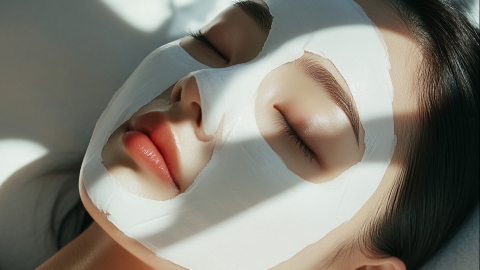Why can't you use a face mask during your period?
"Auntie" is commonly used as a euphemism for menstruation. It's not absolutely forbidden to use face masks during your period, but it's not recommended to use chilled masks, highly active (potent) masks, to leave masks on for long periods, to use masks too frequently, or to use low-quality masks. Improper use may lead to physical discomfort or negatively affect skin condition. If you experience worsened abdominal pain, skin allergies, or other adverse reactions after using a face mask, it's advisable to seek medical attention promptly.
1. Avoid chilled face masks: During menstruation, the pelvic blood vessels are more sensitive. The low temperature of a chilled mask can cause facial blood vessels to constrict, potentially affecting pelvic circulation and worsening menstrual cramps or symptoms of cold uterus. It may also cause facial redness or stinging.
2. Avoid highly active (potent) face masks: Masks containing high concentrations of acids, retinol (vitamin A), or whitening ingredients are not recommended. The skin barrier is weaker during menstruation, making it more prone to irritation or allergic reactions. Additionally, metabolizing these active ingredients may increase the body’s burden and destabilize your condition during this time.

3. Avoid prolonged mask application: Leaving a mask on for more than 20 minutes can lead to excessive hydration of the stratum corneum (outer skin layer), compromising the skin barrier. As skin resistance is already reduced during menstruation, this increases the risk of dryness, sensitivity, and even bacterial growth.
4. Avoid frequent mask usage: Skin metabolism changes during your period. Using face masks too often disrupts the skin’s natural oil-water balance, potentially clogging pores, causing breakouts, increasing skin burden, and interfering with the skin’s natural repair process.
5. Avoid low-quality face masks: Poor-quality masks may contain excessive fragrances or preservatives. Since skin tolerance decreases during menstruation, these ingredients can easily trigger contact dermatitis—resulting in itching, redness, and swelling—and may indirectly affect overall well-being.
During your period, prioritize using mild, hydrating face masks at room temperature. Using them 1–2 times per week is sufficient, with each session lasting no more than 15 minutes. Cleanse your face with lukewarm water before applying the mask, and follow up with a moisturizer to lock in hydration. Avoid over-cleansing or layering multiple functional skincare products.




